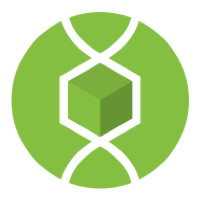
In this newsletter:
QUBES News
- Featured QUBES Partner of the Month: Avida-ED
- Social media love: Tweets about QUBES
- Apply for HHMI BioInteractive/QUBES Faculty Mentoring Network (FMN), Spring/Summer 2020
- Congratulations to QUBES PIs Kristin Jenkins and Carrie Diaz Eaton on their new NSF awards!
- QM BUGS project publishes quantitative modeling assessment in Letters in Biomathematics.
- Blog post discusses EDSIN, a QUBES community focused on promoting diversity in environmental data science.
News from QUBES Partners
- The CYVERSE Learning Institute is offering training in Foundational Open Science Skills.
- Biodiversity Data Literacy Competencies - share your thoughts!
- Data Science in Biology and Environmental Education: Request for Input.
- Accelerating Systemic Change Network (ASCN) Webinar - Collaborative Dynamics in Collective STEM Reform Initiatives
- Job opportunity - Tenure-track assistant professor position in the Department of Mathematics at Grand Valley State University
- Share your Knowledge! Participate in a Survey for Data Science Instructors/Faculty.
- Participate in the 2020 One Health Challenge.
Featured QUBES Partner of the Month: Avida-ED
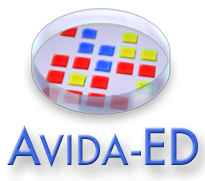
QUBES partners with organizations and groups who are doing exciting things in undergraduate education. Every so often we select one of these partners to feature in our newsletter to raise awareness of their work, celebrate recent activities, and announce upcoming opportunities.
This month’s featured QUBES partner is Avida-ED, an educational application developed at Michigan State University for undergraduate biology courses to help students learn about evolution and scientific method by allowing them to design and perform experiments to test hypotheses about evolutionary mechanisms using evolving digital organisms. Avida-ED was the 2017 winner of the International Society for Artificial Life (ISAL) Education and Outreach Award. Over the past five years, Avida-ED has conducted yearly Active LENS Train-the-trainers Workshops, in which workshop participants learned best practices for implementing classroom interventions using the Avida-ED software and also became equipped to train other educators to use the software. Over a hundred educators at dozens of institutions around the country have participated in these workshops and are using the Avida-ED digital evolution platform in their courses.
There are a several ways QUBES users can engage with Avida-ED:
Learn more about the Avida-ED project.
Visit https://avida-ed.msu.edu/ to learn more about the Avida-ED project. See also the recent publication, “A digital technology‐based introductory biology course designed for engineering and other non‐life sciences STEM majors”.
Explore the Avida-ED curriculum.
The Avida-ED Lab Book contains peer-reviewed model lessons, including in-class, homework and lab exercises, that instructors may download and modify for their own classes under a Creative Commons (Attribution, Non-commercial, Share-Alike) license. A PDF of the most recent version of the lab book is available here and downloadable versions of the materials including answer keys can be found on the Avida-ED Active LENS group on QUBES.
Try out the software.
Both web hosted and downloadable versions of Avida-ED software can be found at https://avida-ed.msu.edu/avida-ed-application/. Launch it in your browser right now!
Stay connected to the Avida-ED project.
Click here to join the Avida-ED mailing list to receive occasional notices about the software.
Social media love: Tweets about QUBES
Periodically we will be highlighting one or more Tweets that show how people are using QUBES. If you have a Twitter account, you can follow us @qubeshub.
This month’s featured tweets are from Kaitlin Stack Whitney, who recently tweeted the news that she has added her data management lesson to the growing collection of Open Education Resources (OER) on QUBES. Her lesson titled, “Introduction to Data Management and Metadata using NEON aquatic macroinvertebrate data”, uses aquatic macroinvertebrate abundance and species information from multiple NEON sampling sites to introduce students to working with metadata.
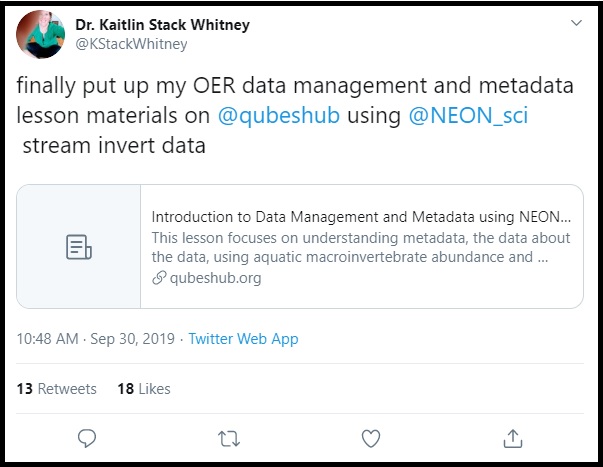
In the thread, Stack Whitney describes the challenges of developing the lesson and is applauded for her work by several Tweeters who indicate that they plan to use her lesson in the future. She welcomes feedback on her lesson and invites others to adopt and adapt her resource. If you are interested in Stack Whitney’s resource, be sure to “watch” this resource so that you’ll be notified when a new version is shared. Those who adapt this resource for a particular teaching setting are highly encouraged to share your resource back with the QUBES community.
Stack Whitney goes on to recommend QUBES Faculty Mentoring Networks (FMNs) for helping faculty develop and share their teaching materials. Stack Whitney has participated in multiple QUBES FMNs, including the 2018 NEON Data Education Fellows FMN in which she participated while creating this lesson. HHMI BioInteractive is already accepting applications for their Spring 2020 FMN and other Spring 2020 FMNs will be announced soon, so if you are interested in participating in an FMN, please subscribe to the QUBES newsletter to receive information about upcoming opportunities.
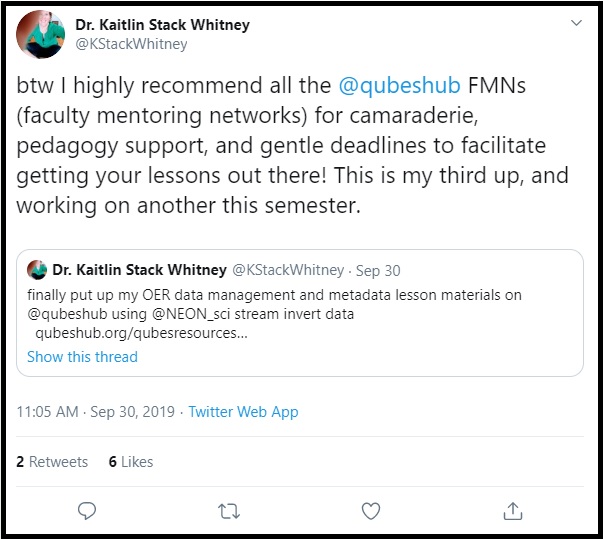
Apply for HHMI BioInteractive/QUBES Faculty Mentoring Network (FMN), Spring/Summer 2020

Application Deadline is December 8th, 2019
Join us to develop data visualization/statistical analysis teaching modules featuring authentic scientific research data to tell exciting biological stories! This faculty mentoring network (FMN) focuses on producing a suite of data analysis modules for college introductory biology or advanced high school level biology. Modules will cover a range of topics identified to be of interest to students, based on empirical student audience research. The participants will coordinate with each other to avoid redundancy of topics, help locate data, and provide feedback to each other. The resulting modules will be published on the QUBESHUB website and receive a DOI, similar to this example. The developed modules will eventually be incorporated into HHMI BioInteractive’s upcoming Data Explorer App.
Applicants should be either a higher ed or advanced high school faculty interested in improving student quantitative skills in biology and be familiar with searching for publicly available data from published primary literature.
Participants must commit to:
-
Produce a data visualization/statistical analysis module by July 2020
-
Plan to incorporate the module in their own Introductory Biology course
-
Meet 1 to 2 hours per month online with mentors and other participants
-
Work independently on module production outside of meetings
-
Review and give feedback on other participants' modules in a substantial and timely manner
-
Attend the 2020 BioQUEST & QUBES summer workshop
Dates and Location:
This FMN will take place from February–June 2020. Participants will meet online regularly (about every two to three weeks) to support the development of the modules, culminating in a final required meeting at the QUBES/BioQUEST Summer Workshop at the University of Pittsburgh, PA, from June 22–27, 2020. HHMI will cover registration and housing costs, but each participant will be responsible for their own travel to and from the workshop. More information regarding the Summer Workshop can be found at https://qubeshub.org/community/groups/summer2020.
More Information and Questions:
If you have questions, please feel free to contact Satoshi Amagai (amagais@hhmi.org) or Kaitlin Bonner (kbonner@sjfc.edu).
Submit your application here.
Congratulations to QUBES PIs Kristin Jenkins and Carrie Diaz Eaton on their new NSF awards!
We would like to congratulate QUBES PIs Kristin Jenkins and Carrie Diaz Eaton on two newly funded projects.

Quantitative Biology at Community Colleges is a Research Coordination Network in Undergraduate Biology Education (RCN-UBE) led by Kristin Jenkins and Vedham Karpakakunjaram. The main goal of this project is to build collaborations of faculty in biology and quantitative fields, particularly at two-year institutions, to develop methods to enhance students' data acumen within the first two years of standard biology courses.
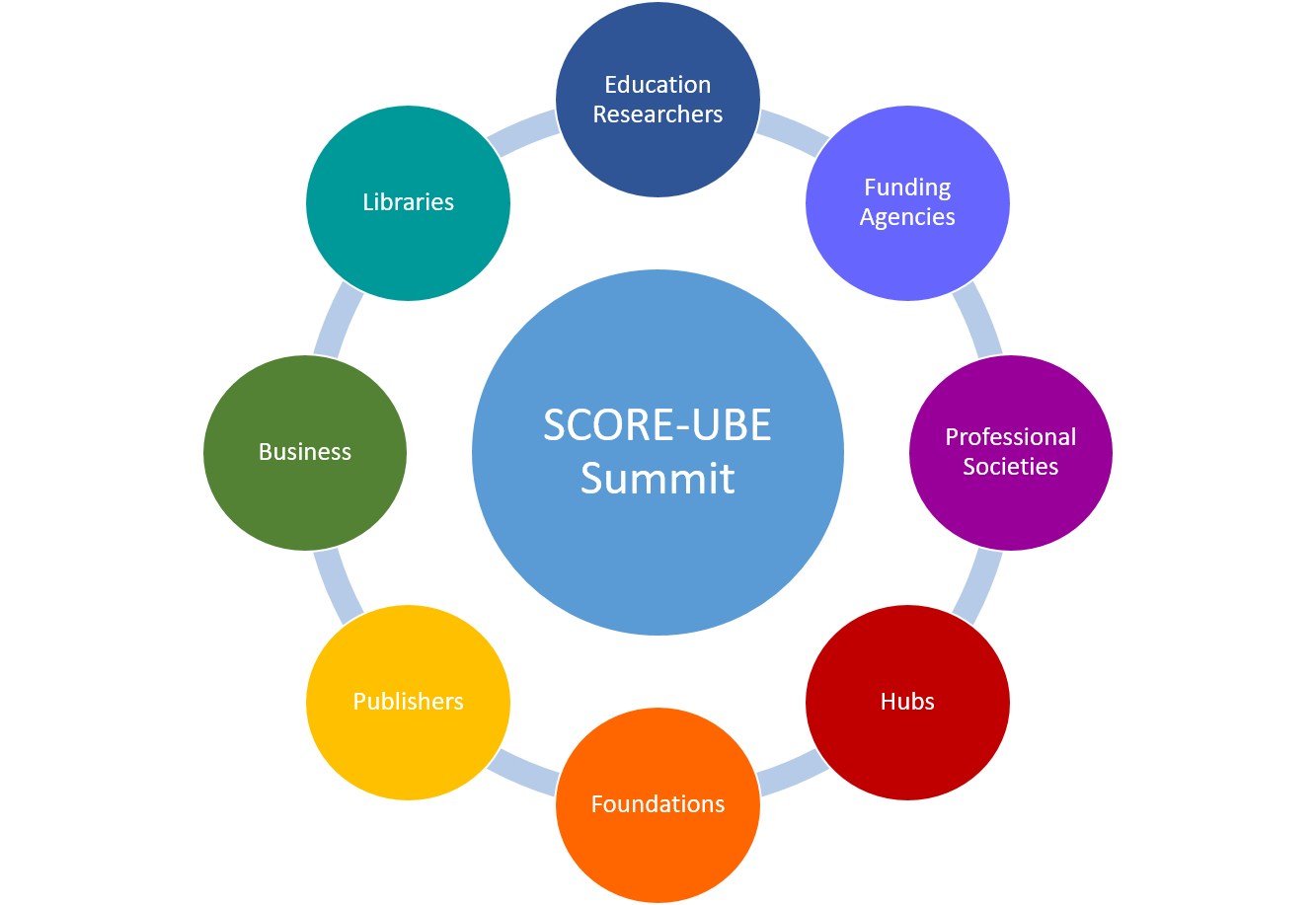
Sustainability Challenges for Open Resources to promote an Equitable Undergraduate Biology Education (SCORE-UBE) is an RCN-UBE Incubator led by Carrie Diaz Eaton and Co-PIs Jeremy Wojdak, Michelle Smith, Kaitlin Bonner, and Jason Douma. SCORE-UBE explores the promise of equity and the realistic challenges of sustainability assumed by open educational resources (OER) in undergraduate biology education and is holding their network launch meeting this weekend at Bates College, Lewiston, ME. Follow along with the conversations on twitter at the hashtag #SCORESummit.
QM BUGS project publishes quantitative modeling assessment in Letters in Biomathematics.
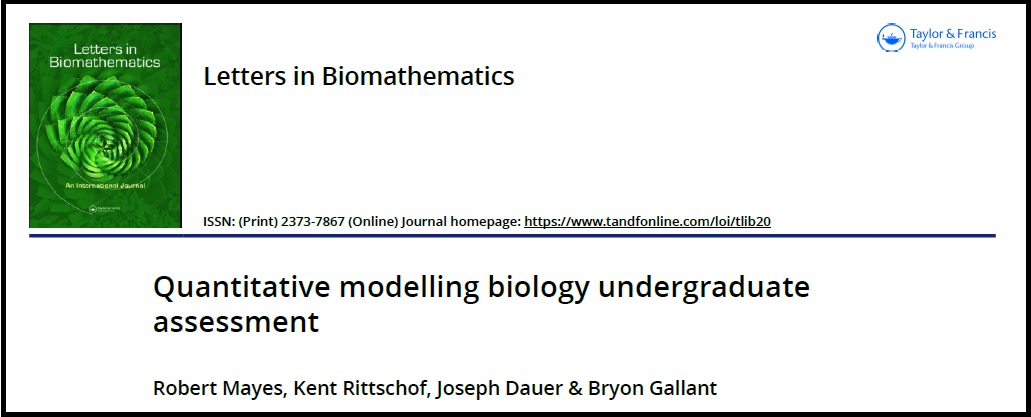
An article by Robert Mayes, Kent Rittschof, Joseph Dauer, and Bryon Gallant of the Quantitative Modelling by Biology UnderGraduate Students (QM BUGS) project appears in the current issue of Letters in Biomathematics. This article by one of QUBES’s collaborating groups discusses the development and validation of an assessment designed to evaluate undergraduate biology students’ confidence in and understanding of quantitative modeling. Click here to view the article.
The QM BUGS project grew out of a National Institute for Mathematical and Biological Synthesis (NIMBioS) Working Group, Unpacking the Black Box, which also involved several QUBES team members. Congratulations, QM BUGS! And we appreciate the generous acknowledgement of QUBES in your article and the shoutout on Twitter!
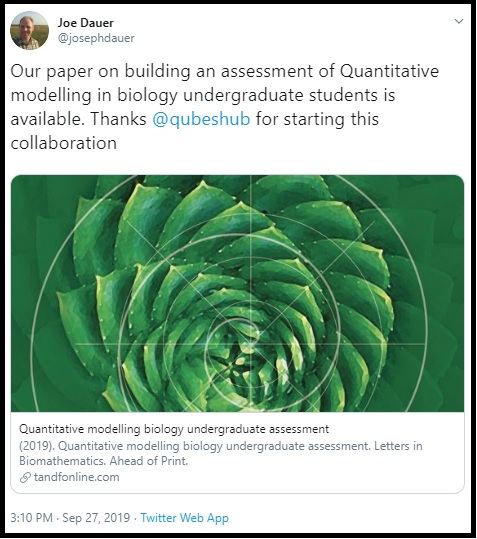
Blog post discusses EDSIN, a QUBES community focused on promoting diversity in environmental data science.
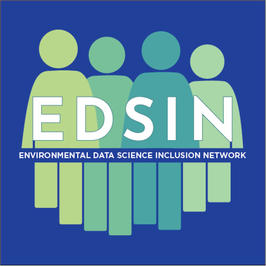
A new post on the National Ecological Observatory Network (NEON) Observatory Blog discusses "Bringing Conversations on Diversity, Equity, and Inclusion in Data Science to the Environmental Science", a conference held in Boulder, Colorado in April 2019. The 3-day conference, whose overarching goals was to create the Environmental Data Sciences Inclusion Network (EDSIN) that works to support diversity and inclusion across environmental data science professions, was a collaborative effort led by NEON, QUBES, and several other network contributors. The blog post discusses the rationale for the conference, conference outcomes, and ways you can get involved with EDSIN. Click here to view the blog post.
The CYVERSE Learning Institute is offering training in Foundational Open Science Skills.

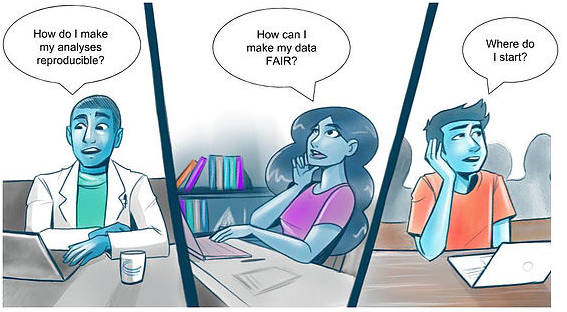
The CYVERSE Learning Institute is offering training in:
Foundational Open Science Skills
February 17–21, 2020
The University of Arizona
Tucson, AZ
Level-up your research career with new skills in Open Science! Foundational Open Science Skills (FOSS) is a novel, camp-style training on computational research, full lifecycle data management, and collaboration skills. FOSS is designed to prepare principal investigators and their lab teams to meet the growing expectations of funding agencies, publishers, and research institutions for scientific reproducibility, data accessibility, and advanced analytics in the ever-evolving research datascape.
Topics include:
-
Open science resources for managing rigorous, reproducible projects
-
Cloud, HPC, and other computing technologies for scaling analyses
-
Metadata management skills for discovery, integration, and reuse
-
Writing and implementing a data management plan to NSF-BIO guidelines
-
Creating and nurturing an open science culture in your lab and collaborations
More Information and To Apply
Scholarships for NSF-BIO PIs
A limited number of tuition waivers are available for NSF-BIO-funded PIs or those intending to apply for NSF-BIO funding within the next year.
More training opportunities!
Bring your data for Container Camp 2020 (March 10–13), a three-day, hands-on, how-to workshop on container technology for scientific reproducibility: www.cyverse.org/cc
Biodiversity Data Literacy Competencies - share your thoughts!
Please find a message below from the Biodiversity Literacy in Undergraduate Education Research Coordination Network (BLUE) Data Competencies Team.
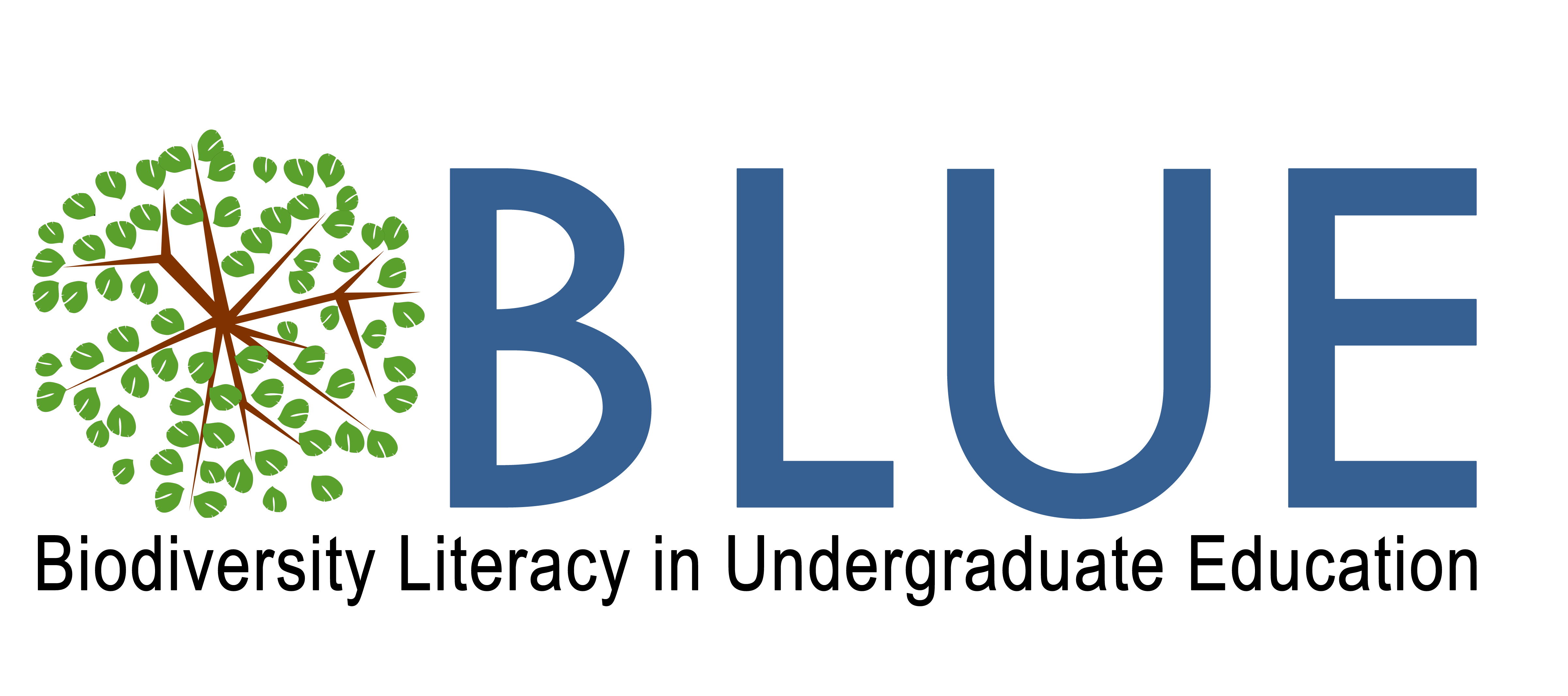
Dear Colleague,
We are asking for your help to define a core set of biodiversity data literacy competencies. The goal is to use these to guide a set of recommendations for improving undergraduate biology training and meeting increasing workforce demands in both data and biodiversity sciences. Please consider joining this effort and completing this anonymous survey if you are in one or more of the following groups:
-
Educators who teach and/or supervise undergraduate or graduate students in the biological sciences
-
Organismal, ecological, and environmental researchers who generate and use large aggregated biodiversity dataset
-
Discipline-based education researchers
-
Data scientists and biodiversity informaticians
-
Curators or researchers working with natural history collections
The survey should take you approximately 15-25 minutes to complete.
This is an initiative of the Biodiversity Literacy in Undergraduate Education Research Coordination Network (BLUE). BLUE is an inclusive community of biodiversity, data, and education researchers working to identify a transferable set of core biodiversity data competencies for undergraduates, develop strategies for integrating these competencies into the introductory biology curriculum, and build capacity for sustained development and implementation of biodiversity and data literacy education.
Thank you in advance for your input and efforts.
BLUE Biodiversity Data Competencies Team:
Anna Monfils, Central Michigan University
Natalie Douglas, Central Michigan University
Alexa Clemmons, University of Washington
Debra Linton, Central Michigan University
Elizabeth Ellwood, La Brea Tar Pits & Natural History Museum of Los Angeles County
Data Science in Biology and Environmental Education: Request for Input
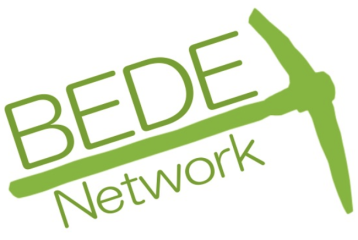
The Biological and Environmental Data Education (BEDE) Network project is conducting a study on the perceptions of the importance of data science in undergraduate biology curricula. If you connect with this topic please join us by taking a few minutes to respond to our short survey.
Accelerating Systemic Change Network (ASCN) Webinar - Collaborative Dynamics in Collective STEM Reform Initiatives
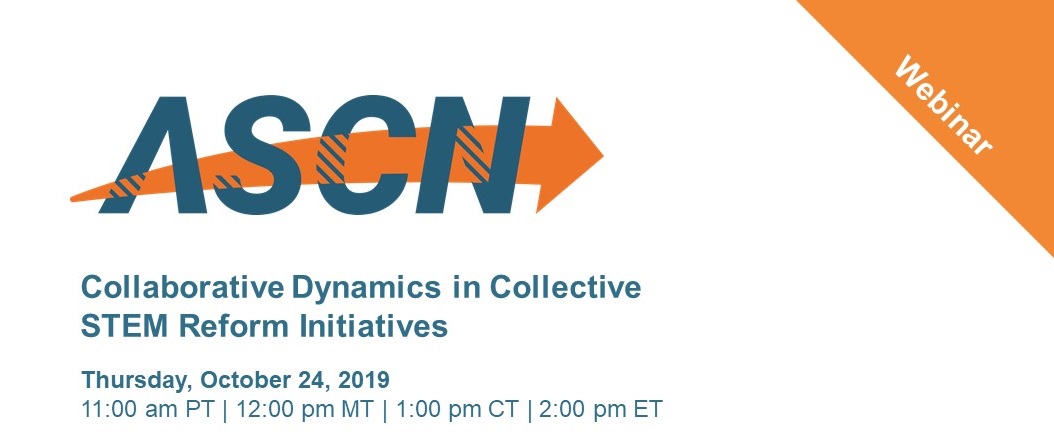
Please join us for an upcoming webinar on October 24, Collaborative Dynamics in Collective STEM Reform Initiatives. The registration deadline is Tuesday, October 22. Register here: bit.ly/ASCNwebCollab
Collaborative Dynamics in Collective STEM Reform Initiatives
Thursday, October 24, 2019
11:00 am PT | 12:00 pm MT | 1:00 pm CT | 2:00 pm ET
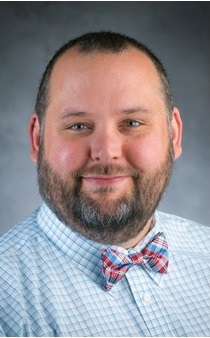
Presenter: Lucas Hill, University of Wisconsin-Madison
Abstract: Reform efforts in science, technology, engineering, and mathematics (STEM) education increasingly rely on collaboration from diverse stakeholders to achieve collective change goals. The basic premise is that initiatives can achieve more collectively than through individual siloed reform efforts. Yet, despite recent efforts to frame and even model productive collaboration (e.g., Collective Impact and networked improvement communities), our understanding of how to build collaborative STEM reform initiatives among diverse partners is still rather nascent (though certainly growing). In this webinar, the author will present the Dimensions of Collaborative Dynamics Framework, which identifies the key elements, related to motivation, group norms and processes, support resources, and leadership, that collaborative STEM reform initiatives need to pay attention to in advancing their collective change goals. The framework is the result of a synthesis of three decades of multidisciplinary research and literature regarding complex multi-institutional and multi-sector collaboration and partnerships.
This webinar is designed for individuals involved in STEM education reform initiatives or even recipients of change efforts; this includes STEM future and current faculty; academic and administrative leaders at 2- and 4-year colleges and universities; and leaders and staff of non-profit organizations, professional societies and disciplinary associations, and funding organizations.
Job opportunity - Tenure-track assistant professor position in the Department of Mathematics at Grand Valley State University

The Grand Valley State University Department of Mathematics is searching for a tenure-track assistant professor whose expertise/experience is in applied or computational mathematics. The position begins in August 2020. More information about this position can be found at http://gvsu.edu/s/192. The application deadline is November 8, 2019. Email questions about the position to: Matt Boelkins, Mathematics Search Committee chair, boelkinm@gvsu.edu.
Share your Knowledge! Participate in a Survey for Data Science Instructors/Faculty.
Please find an message below from Katherine M. Kinnaird, Bjorn Sandstede, Karl R.B. Schmitt, and Ruth E.H. Wertz.
Dear Colleagues,
If you instruct data science courses, or can share with your colleagues who do, we invite you to take (or share) a survey about data science and how various concepts and skills relate to professional practice. This survey is part of an NSF TRIPODS-X grant that is exploring students’ misconceptions with data science concepts as they begin their data science education.
The survey can be found at:
https://smithcollege.qualtrics.com/jfe/form/SV_brN0OD8pPJFRhFb
The purpose of the survey is to identify which knowledge areas and skills are within data science and more specifically, which should be part of a first course in data science. A secondary goal of this survey is to collect information about data science jobs and various concept's relevance to specific industry jobs.
This survey should take about 20 minutes, and participants will be entered in a drawing to win $25 at Amazon. Please let us know if you have any questions regarding this survey.
Please feel free to forward this email directly to any of your colleagues that might not receive this through list-serves.
Thank you for supporting our grant work.
Best,
Katherine M. Kinnaird
Bjorn Sandstede
Karl R.B. Schmitt
Ruth E.H. Wertz
Participate in the 2020 One Health Challenge
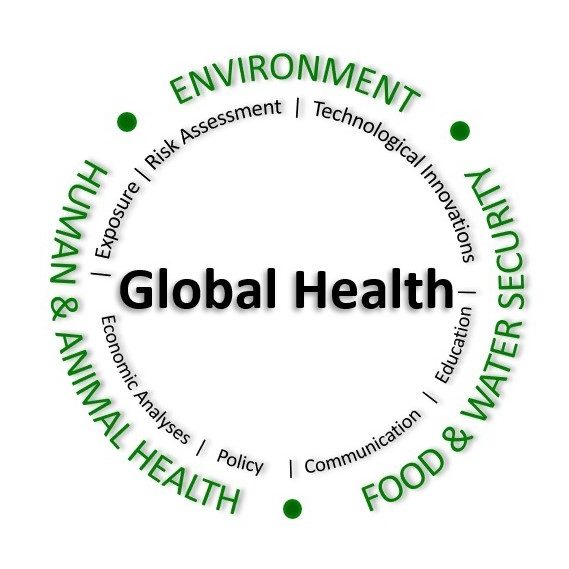
Please find a message below from Mieka Smart on behalf of the Michigan State University (MSU) One Health Challenge.
Dear colleague:
I am Mieka Smart, writing on behalf of the Michigan State University (MSU) One Health Challenge, organized by the MSU Canadian Studies Center in partnership with the Institute for Global Health (IGH), and the College of Veterinary Medicine. I am contacting you about an exciting program designed to build partnership and momentum around One Health. As you may know, One Health is communication and collaboration across human, animal and environmentally-focused networks for the prevention of disease and health management.
We would like to invite you and your organization to be a part of the 2020 One Health Challenge—an international graduate student case competition coordinated at Michigan State University. Additional information about the challenge can be found here. Your participation will help to expose students to understand how interdisciplinary connections lead to solutions for health problems. There are several ways to be involved: judge the case presentations, provide a guest lecture, serve as a team mentor, or participate in networking events. Faculty can partner by having graduate students participate. Please contact me at smartmie@msu.edu with questions or to express your interest.
Thank you for considering. I look forward to hearing from you.
Sincerely,
Mieka Smart, Dr.P.H., M.H.S.
Michigan State University Institute for Global Health
Phone: 810-600-5682 Fax: 810-600-5609
Email: smartmie@msu.edu
|